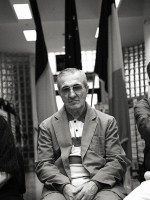Mircea Diaconu is a Actor Roumain born on 24 december 1949
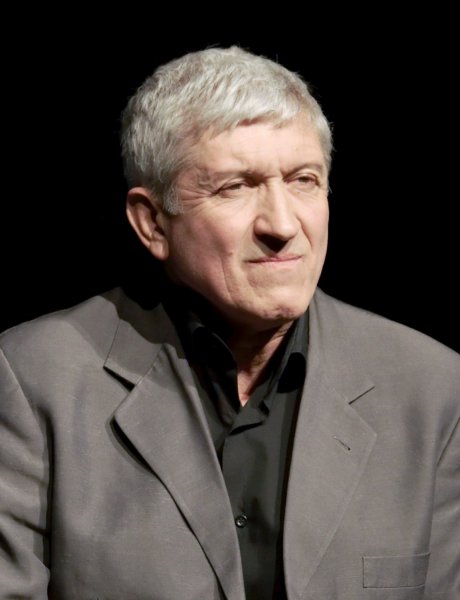
Mircea Diaconu ([ˈmirt͡ʃe̯a diˈakonu]; born 24 December 1949) is a Romanian actor and politician.
Born in Vlădești, Argeș County, he graduated high school in Câmpulung in 1967 and Bucharest's Caragiale Academy of Theatrical Arts and Cinematography in 1971. He made his theatrical debut a year before graduating, at the Bulandra Theater, in Truman Capote's The Grass Harp. His screen debut came in Dan Pița's Nunta de piatră (1972); he would later appear in the same director's Filip cel Bun (1975). Other directors with whom he has worked include Alexandru Tatos (Mere roșii, 1975; Secvențe, 1982; and Secretul armei secrete, 1988), Virgil Calotescu (Buletin de București, 1982; and Căsătorie cu repetiție, 1985), Nae Caranfil (Asfalt Tango, 1996; and Filantropica, 2002) and Cătălin Mitulescu (The Way I Spent the End of the World, 2006). In all, he has appeared in more than sixty films.
Diaconu worked with Lucian Pintilie both in film (the 1981 De ce trag clopotele, Mitică?) and in theater: Gogol's The Government Inspector at Bulandra, and Shakespeare's As You Like It at the Nottara Theater. Liviu Ciulei hired him at Bulandra in 1972, and he remained there for a decade, before moving on to Nottara. At Bulandra, he appeared in Twelfth Night and The Tempest, both under Ciulei's direction; and in Marin Sorescu's Răceala, directed by Dan Micu. At Nottara, he appeared in Alexander Ostrovsky's The Forest; Ultimul bal, after Liviu Rebreanu's Forest of the Hanged; and Mihai Ispirescu's Într-o dimineață. He became the director of Nottara Theater in 2004, working as such until his resignation in 2011.
A participant in the Romanian Revolution, he was rehearsing a play at Nottara when Nicolae Ceaușescu's final speech began on 21 December 1989. During the day, he and his colleagues organized students to go to area factories and urge workers to declare an immediate strike. He spent the night outdoors with students, believing that, although the uprising lacked familiar leaders who could be trusted, the crowd at least recognized popular actors' faces. During the night, Securitate secret police fired through apartment windows, while the next morning, Diaconu saw that agents had quietly killed people with brass knuckles. However, he soon noticed that a revolution was in full swing, the boulevards leading to the city center packed with advancing workers who had trapped two tanks, one of which he rode to the Central Committee building from which Ceaușescu had spoken the previous day. Later, he was among several figures to appear before a microphone in Palace Square. Addressing a throng chanting anti-Ceaușescu slogans, he repeated an appeal for calm.
In 1990 he became the country's first actor to resign his contract with a theater and become a freelancer. Other theaters with which he has appeared include Theatrum Mundi and the National Theatre Bucharest. He taught acting at his alma mater between 1977 and 1978, and again from 1991 to 1998. He wrote three books that appeared under the Communist regime. The first, Șugubina (1977), is a volume of short stories. The second, La noi, când vine iarna, was initially published as a children's book in 1980 and was republished as a novel for adults in 2013. The third, Scaunul de pânză al actorului (1985), includes sketches about the theatrical world. He was obliged to join the Romanian Communist Party during his second year of university, due to the high grades he had achieved.
Politics
He began his political career in 2008, when he was elected to the Senate for Argeș County as a member of the National Liberal Party (PNL). While there, he served on the culture committee; his term expired at the following election. In May 2012, he was named Culture Minister in the new Victor Ponta cabinet, but was forced out of office the following month when the High Court of Cassation and Justice ruled there was a conflict of interest between his ministerial position and his managerial role at the theater.
In March 2014, when the PNL failed to include him on its list of candidates for that year's European Parliament election, Diaconu decided to run as an independent. Although his candidacy was initially rejected by the electoral authorities because the 2012 court decision had found him ineligible for political office, an appeals court placed him on the ballot, finding that he could in fact run for other offices than the one involved in the older case (that is, Senator). During the campaign, he built up the image of an independent persecuted by bureaucratic institutions determined to keep him out of office, benefiting from favorable media coverage. He won some 380,000 votes or 6.8% of the national total (ahead of two political parties that won seats), assuring him a term as an MEP. As an independent, he was only required to win 3.1% of the vote in order to secure a seat; he obtained double digits in the counties of Constanța (13.3%) and Botoșani (10.4%). He is thought to have significantly eroded the PNL vote, with one party member, Nicolae Robu, claiming Diaconu cut its performance by nearly half. In the European Parliament, he sits with the Alliance of Liberals and Democrats for Europe Group, and is vice president of the Culture Committee.
In 1980 he married Diana Lupescu, herself an actress; the couple have two children. In 2012, he was the subject of an investigation by prosecutors for having helped hire her as a director at Nottara in 2007, despite the fact that she did not meet the necessary qualifications.
Source : Wikidata
Mircea Diaconu

- Infos
- Photos
- Best films
- Family
- Characters
- Awards
Biography
Acting, writing, RevolutionBorn in Vlădești, Argeș County, he graduated high school in Câmpulung in 1967 and Bucharest's Caragiale Academy of Theatrical Arts and Cinematography in 1971. He made his theatrical debut a year before graduating, at the Bulandra Theater, in Truman Capote's The Grass Harp. His screen debut came in Dan Pița's Nunta de piatră (1972); he would later appear in the same director's Filip cel Bun (1975). Other directors with whom he has worked include Alexandru Tatos (Mere roșii, 1975; Secvențe, 1982; and Secretul armei secrete, 1988), Virgil Calotescu (Buletin de București, 1982; and Căsătorie cu repetiție, 1985), Nae Caranfil (Asfalt Tango, 1996; and Filantropica, 2002) and Cătălin Mitulescu (The Way I Spent the End of the World, 2006). In all, he has appeared in more than sixty films.
Diaconu worked with Lucian Pintilie both in film (the 1981 De ce trag clopotele, Mitică?) and in theater: Gogol's The Government Inspector at Bulandra, and Shakespeare's As You Like It at the Nottara Theater. Liviu Ciulei hired him at Bulandra in 1972, and he remained there for a decade, before moving on to Nottara. At Bulandra, he appeared in Twelfth Night and The Tempest, both under Ciulei's direction; and in Marin Sorescu's Răceala, directed by Dan Micu. At Nottara, he appeared in Alexander Ostrovsky's The Forest; Ultimul bal, after Liviu Rebreanu's Forest of the Hanged; and Mihai Ispirescu's Într-o dimineață. He became the director of Nottara Theater in 2004, working as such until his resignation in 2011.
A participant in the Romanian Revolution, he was rehearsing a play at Nottara when Nicolae Ceaușescu's final speech began on 21 December 1989. During the day, he and his colleagues organized students to go to area factories and urge workers to declare an immediate strike. He spent the night outdoors with students, believing that, although the uprising lacked familiar leaders who could be trusted, the crowd at least recognized popular actors' faces. During the night, Securitate secret police fired through apartment windows, while the next morning, Diaconu saw that agents had quietly killed people with brass knuckles. However, he soon noticed that a revolution was in full swing, the boulevards leading to the city center packed with advancing workers who had trapped two tanks, one of which he rode to the Central Committee building from which Ceaușescu had spoken the previous day. Later, he was among several figures to appear before a microphone in Palace Square. Addressing a throng chanting anti-Ceaușescu slogans, he repeated an appeal for calm.
In 1990 he became the country's first actor to resign his contract with a theater and become a freelancer. Other theaters with which he has appeared include Theatrum Mundi and the National Theatre Bucharest. He taught acting at his alma mater between 1977 and 1978, and again from 1991 to 1998. He wrote three books that appeared under the Communist regime. The first, Șugubina (1977), is a volume of short stories. The second, La noi, când vine iarna, was initially published as a children's book in 1980 and was republished as a novel for adults in 2013. The third, Scaunul de pânză al actorului (1985), includes sketches about the theatrical world. He was obliged to join the Romanian Communist Party during his second year of university, due to the high grades he had achieved.
Politics
He began his political career in 2008, when he was elected to the Senate for Argeș County as a member of the National Liberal Party (PNL). While there, he served on the culture committee; his term expired at the following election. In May 2012, he was named Culture Minister in the new Victor Ponta cabinet, but was forced out of office the following month when the High Court of Cassation and Justice ruled there was a conflict of interest between his ministerial position and his managerial role at the theater.
In March 2014, when the PNL failed to include him on its list of candidates for that year's European Parliament election, Diaconu decided to run as an independent. Although his candidacy was initially rejected by the electoral authorities because the 2012 court decision had found him ineligible for political office, an appeals court placed him on the ballot, finding that he could in fact run for other offices than the one involved in the older case (that is, Senator). During the campaign, he built up the image of an independent persecuted by bureaucratic institutions determined to keep him out of office, benefiting from favorable media coverage. He won some 380,000 votes or 6.8% of the national total (ahead of two political parties that won seats), assuring him a term as an MEP. As an independent, he was only required to win 3.1% of the vote in order to secure a seat; he obtained double digits in the counties of Constanța (13.3%) and Botoșani (10.4%). He is thought to have significantly eroded the PNL vote, with one party member, Nicolae Robu, claiming Diaconu cut its performance by nearly half. In the European Parliament, he sits with the Alliance of Liberals and Democrats for Europe Group, and is vice president of the Culture Committee.
In 1980 he married Diana Lupescu, herself an actress; the couple have two children. In 2012, he was the subject of an investigation by prosecutors for having helped hire her as a director at Nottara in 2007, despite the fact that she did not meet the necessary qualifications.
Usually with
Filmography of Mircea Diaconu (13 films)
Actor

Love Sick (2006)
, 1h26Directed by Tudor Giurgiu
Origin Roumanie
Genres Drama
Themes Films about families, Films about sexuality, LGBT-related films, LGBT-related films, LGBT-related film, Lesbian-related films
Actors Maria Popistașu, Ioana Barbu, Tudor Chirilă, Mircea Diaconu, Carmen Tanase
Roles Mr. Dragnea
Rating65%





Alex and Cristina (Kiki) are university students who end up living in the same building. Their friendship develops quickly, overcoming several phases, from fellowship to care and tenderness. While the two are very different, the two girls get along fine, except for the moments when a third character shows up — Sandu. Kiki’s brother is permanently tormented by an unnatural jealousy which implies an incestuous liaison between the two siblings.
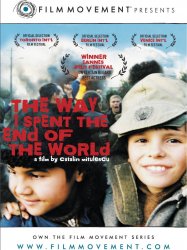 , 1h50
, 1h50Origin Roumanie
Genres Drama
Actors Dorotheea Petre, Jean Constantin, Jean Constantin, Mircea Diaconu, Florin Zamfirescu
Roles Grigore Matei
Rating70%





The film is about 17-year-old Eva and 7-year-old Lilu, a sister and brother living in Bucharest during the final years of the communist regime of Nicolae Ceauşescu. After Eva is expelled from her high school for her uncooperative attitude, she is sent to a technical school where she meets Andrei, with whom she plans to escape communist Romania by swimming across the Danube into Yugoslavia and relocating to Italy. Lilu and his friends, meanwhile, volunteer for a children's choir scheduled to sing for Ceauşescu, hoping this will give them a chance to assassinate the dictator.
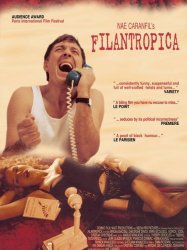
Philanthropy (2002)
, 1h50Origin Roumanie
Genres Drama, Comedy
Themes Films about writers
Actors Gheorghe Dinică, Mircea Diaconu, Anamaria Marinca, Florin Zamfirescu
Roles Ovidiu Gorea
Rating83%





Ovidiu Gorea is a jaded, mid-40s, high-school teacher and novice writer, still living with his parents. He has just published a collection of short stories called 'Nobody Dies For Free', that the bookstores reject because no one buys it.

Reach for the Sky (1990)
, 1h32Directed by Elisabeta Bostan
Origin Canada
Genres Drama
Actors Mircea Diaconu, George Mihăiţă, Luminița Gheorghiu
Roles Mircea
Rating65%





Corina, une jeune roumaine de 10 ans, rêve de devenir championne de gymnastique. Inscrite, tout comme sa meilleure amie Maria, à la célèbre école de gymnastique de Deva, c’est à force de d’entraînement, d’efforts, de courage et de volonté qu’elle réussira à dépasser ses propres limites.

Flames Over Treasures (1988)
Directed by Nicolae Mărgineanu
Genres Drama
Actors Mircea Albulescu, Claudiu Bleonț, Mircea Diaconu
Roles Barkeeper
Rating74%





 , 1h59
, 1h59Directed by Lucian Pintilie
Origin Roumanie
Genres Drama, Comedy, Comedy-drama
Actors Victor Rebengiuc, Gheorghe Dinică, Mircea Diaconu, Ştefan Iordache, Răzvan Vasilescu, Florin Zamfirescu
Roles Iordache
Rating77%





Dans une petite société bourgeoise, les personnages intriguent et connaissent des aventures amoureuses.
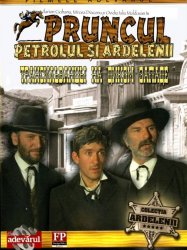 , 1h48
, 1h48Directed by Dan Pița
Origin Roumanie
Genres Crime, Western
Actors Ilarion Ciobanu, Mircea Diaconu, Jean Constantin, Ştefan Iordache, Jean Constantin
Roles Romulus Brad
Rating75%





The Oil, the Baby and the Transylvanians is the third part of a fairly successful Romanian trilogy about three Transylvanian brothers, their families, and their companions in frontier America, on the Great Plains. Set in the 1880s, the drama, comedy, and perhaps appeal of the film comes from the characters' difficulty in adjusting to the American rhythm and lifestyle.
 , 1h59
, 1h59Directed by Lucian Pintilie
Origin Roumanie
Genres Drama, Comedy
Actors Victor Rebengiuc, Gheorghe Dinică, Mircea Diaconu, Ştefan Iordache, Florin Zamfirescu, Mitică Popescu
Roles Iordache
Rating77%





Au milieu d’un carnaval tenu par une petite société bourgeoise, marivaudages et aventures amoureuses se multiplient jusqu’à ce qu’un billet doux égaré provoque le scandale.
 , 1h12
, 1h12Directed by Mircea Veroiu
Origin Roumanie
Genres Action, Western
Actors Ilarion Ciobanu, Mircea Diaconu, Mircea Albulescu, Marcel Iureș
Roles Romulus Brad
Rating73%





A train carrying passengers and money is ambushed by Indians. The passengers realize that the "Indians" are disguised bandits and the bandits murder them all.
 , 1h38
, 1h38Directed by Dan Pița, Mircea Veroiu
Origin Roumanie
Genres Comedy, Western
Actors Ilarion Ciobanu, Mircea Diaconu, Victor Rebengiuc
Roles Romulus Brad
Rating74%





The mining town of Cedar City, Utah, is ruled by Mr. Walthrope, a polygamous Mormon prophet (Victor Rebengiuc), his son the marshall (Gheorghe Visu) and their band of ruffians.
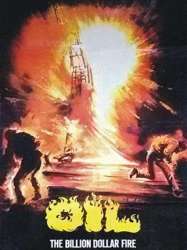
Oil (1977)
, 1h30Directed by Mircea Drăgan
Origin Roumanie
Genres Action, Adventure
Themes Disaster films
Actors Stuart Whitman, Gheorghe Dinică, Radu Beligan, Florin Piersic, Jean Constantin, Jean Constantin
Roles Grigore
Rating60%





An International petroleum company named "Consolidated Oil" secretly lights an oil well in the Sahara because the local government in the Middle East doesn't comply with their demands. Due to the expected size of the damage oil prices hit the roof. Merely as an alibi the company's president (Mr. Stewart) assigns John Carter aka "Salamander" to take care of this matter. Yet once Carter arrives on location one of the company's representants hinders him to extinguish the endurance burning and signalises to him that this catastrophe happened for a reason. "Consolidated Oil" hires a Romanian crew with lesser experience in regards to this kind of burnings. But the Romanian specialists team up with Carter and find prove for arson. Step by step they succeed in putting the seven fire sources to rest. "Consolidated Oil" tries to sabotage the firefighting but their attempts are proven futile. Finally the International news media disclose the conspiration. Stewart is unmasked as one of the driving forces behind the scheme. He needs to learn that he is chosen as a pawn sacrifice and while he still thinks this over he is murdered. His secretary isn't surprised at all when she's informed he just died. Instead she is eager to show the obituary she wrote. Meanwhile the Romanian firefighters are publicly celebrated in Arabia.

The Actor and the Savages (1975)
, 2h30Directed by Manole Marcus
Origin Roumanie
Genres Drama, Comedy
Actors Toma Caragiu, Mircea Albulescu, Mircea Diaconu, Manole Marcus, Ion Besoiu, Margareta Pogonat
Roles Radu Toma
Rating86%





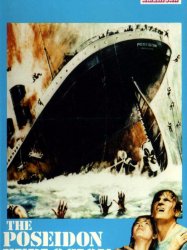
The Poseidon Explosion (1973)
, 1h52Directed by Mircea Drăgan
Origin Roumanie
Genres Drama, Action
Actors Radu Beligan, Gheorghe Dinică, Toma Caragiu, Dem Rădulescu, Jean Constantin, Jean Constantin
Rating64%





Le bateau Poseidon arrive en flammes au port de Galati, sans équipage à part un matelot et une passagère clandestin. A bord, la cargaison de nitrate d'ammonium risque d'exploser à tout moment... D'après une histoire vraie.
 Connection
Connection

